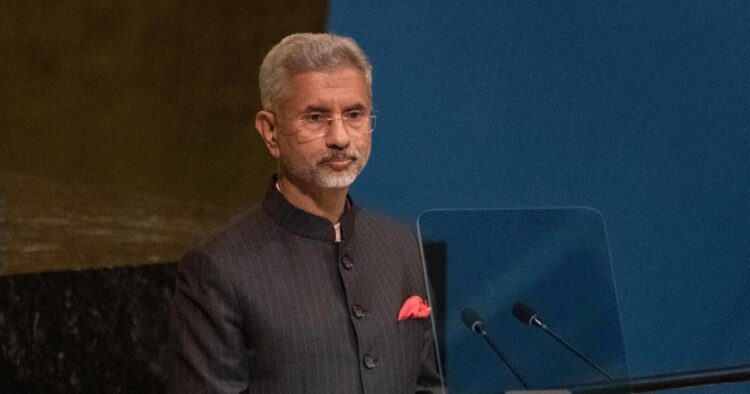India’s External Affairs Minister, S. Jaishankar, recently addressed the press in Tokyo, shedding light on the current state of relations between India and China. His comments highlighted significant strains in bilateral ties, largely stemming from ongoing border tensions that have not been fully resolved. This tension has become a crucial point of focus, especially as India strengthens its partnerships in the Indo-Pacific region.
#WATCH | Tokyo, Japan: On China, External Affairs Minister Dr S Jaishankar says "We have views on China based on our experience. Our relations with China are not doing very well, the main reason for that is in 2020, during the COVID, China brought very large forces to the border… pic.twitter.com/0hViLPSvNY
— ANI (@ANI) July 29, 2024
Strained Relations with China
Jaishankar’s remarks came in the wake of persistent issues along the Line of Actual Control (LAC), the de facto border between India and China. The minister pointed out that the relationship between New Delhi and Beijing is far from normal, citing a significant clash that occurred in 2020. During the COVID-19 pandemic, China reportedly mobilized a substantial military force to the border regions, breaching existing agreements. This led to a violent confrontation in Galwan Valley, resulting in casualties on both sides.
The clash at Galwan Valley has left a lasting impact on the relationship, with ongoing tensions marking the interactions between the two nations. Jaishankar emphasized that the situation remains unresolved, contributing to the current discord between India and China. He expressed hope for improved relations, but stressed that this can only be achieved if China adheres to the agreements made in the past and respects the existing Line of Control (LOC).
Quad Alliance and Regional Cooperation
On the same day, the Quad Foreign Ministers Meeting was held in Tokyo, featuring leaders from India, Australia, Japan, and the United States. The meeting underscored the Quad’s commitment to maintaining stability and prosperity in the Indo-Pacific region. The joint statement from the Quad nations announced the launch of a “Quad maritime legal dialogue,” aiming to address international law issues related to maritime security.
The statement emphasized the importance of upholding a rules-based maritime order, which is essential for ensuring freedom of navigation and overflight.
#WATCH | Tokyo, Japan: External Affairs Minister Dr S Jaishankar says "India is the host for this year's Quad and we are still discussing when to do the Summit…Regarding the agenda, we came up with some new ideas today but I can generally tell you that the idea for example is… pic.twitter.com/wwAKMLR5b9
— ANI (@ANI) July 29, 2024
The Quad countries reaffirmed their commitment to international law, particularly the United Nations Convention on the Law of the Sea (UNCLOS). They stressed that maritime disputes should be resolved peacefully and in accordance with international law.
In addition to maritime security, the Quad nations are focusing on practical cooperation in areas such as critical technologies, cyber security, health security, and climate change. The alliance is also addressing regional challenges like counterterrorism, infrastructure development, and sustainable financing practices.
India’s Position on the Ukraine Conflict
Amid the ongoing conflict between Russia and Ukraine, Jaishankar reiterated India’s stance on the issue. He emphasized that a resolution cannot be achieved through military means and called for a return to dialogue and diplomacy. According to Jaishankar, the conflict has caused significant loss of life, economic damage, and global consequences, including inflation and disruptions to other societies.
India has consistently advocated for peaceful resolution through dialogue, a stance that aligns with its broader foreign policy principles. Despite this, India has continued to engage in trade with Russia, including purchasing Russian oil, which has been a point of contention with Western nations.
PM Modi’s Visit to Russia
In a related development, Indian Prime Minister Narendra Modi recently visited Moscow, marking his first trip to Russia since the onset of the Ukraine conflict. During his visit, PM Modi met with Russian President Vladimir Putin. The visit highlighted India’s diplomatic balancing act, as it continues to promote peace and diplomacy while maintaining its strategic partnerships.
PM Modi expressed deep concern over the loss of innocent lives due to the conflict, emphasizing the humanitarian aspect of the crisis. He reiterated India’s belief that dialogue is the only way to resolve the conflict, aligning with Jaishankar’s earlier statements on the matter.
As India navigates its complex relationships with both China and Russia, it faces significant challenges in maintaining regional stability and fostering international cooperation. The strained relations with China underscore the need for continued dialogue and adherence to agreements, while India’s role in the Quad alliance reflects its commitment to a stable and prosperous Indo-Pacific region.
ALSO READ: “EAM Jaishankar Launches Common Yoga Protocol in Lao Language in Vientiane”
The ongoing conflict in Ukraine remains a critical issue on the global stage, with India advocating for peaceful resolution through diplomacy. As these geopolitical dynamics unfold, India’s actions and policies will likely continue to influence regional and global affairs.

















Comments